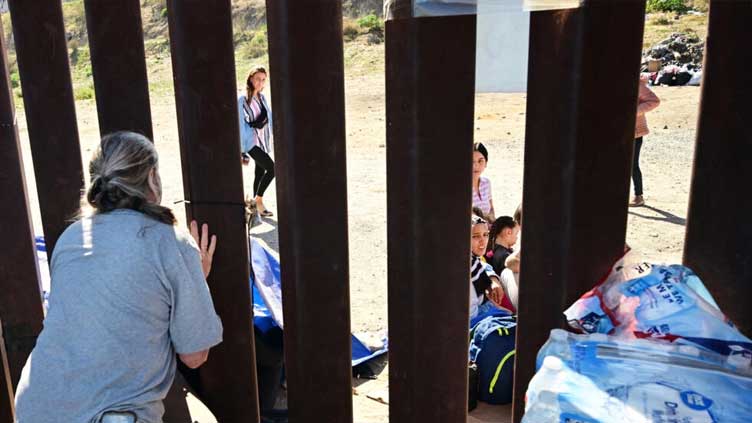Migrant surge in US sparks anguish in Democratic cities

World
The dysfunction in San Diego is repeated on a larger scale in hubs like NY, Chicago
San Diego (AFP) – Hundreds of migrants congregate by the huge wall marking the US-Mexico border in southern California, a tiny glimpse of the crisis unfolding in American cities as new arrivals strain resources to breaking point.
The dysfunction in the border city of San Diego is repeated on a larger scale in hubs like New York and Chicago -- testing the patience of local Democratic leaders who say their own man in the White House is failing on a very pressing problem.
"The reality is that we don't have sufficient funds," Nora Vargas, a Democrat on San Diego County's Board of Supervisors, told AFP.
"We've been trying to create a plan with the county, with the federal government and the state of California. And as we continue to plan, the numbers continue to increase. "As a result, last week, we declared it a humanitarian crisis."
Immigration has long been a contentious topic in the United States, with Republican and Democratic politicians presenting differing visions on how to rehaul the country's broken system.
A huge influx of arrivals this year -- US media report a record 2.4 million migrant encounters at the southern border over the last 12 months -- is testing the traditional Democratic stance of welcoming even those who come into the country without permission.
In San Diego, migrants -- most fleeing poverty and desperation in Latin America, along with others from Africa or Asia -- are given wristbands that say when they crossed. Local authorities try to process them within two days.
But a massive backlog to see immigration judges, with waits of two years or more, means at this stage the migrants are merely shuttled through overcrowded processing centers and directed to interstate buses. The situation is repeated in communities along the southern US border.
Republican-run Texas isn't wringing its hands. Governor Greg Abbott buses newly arrived migrants to cities like New York and Chicago, forcing their Democratic administrations to deal with a crisis that until recently was concentrated in border towns.
- 'Untenable situation' -
New York has absorbed more than 100,000 migrants in the last twelve months, and Mayor Eric Adams and state Governor Kathy Hochul have adopted a hardline stance.
We don't have capacity," Hochul told CNN last month. "We're at our limit, if you're going to leave your country, go somewhere else." Adams last year declared a state of emergency in the city, where the crisis is estimated to cost taxpayers about $5 billion.
He has been explicit about where the blame lies. "The president and the White House have failed this city," Adams said in April.
The Democratic governor of Illinois, JB Pritzker, similarly pulled no punches against his own side after more than 15,000 migrants arrived in his state, with footage showing public buildings crowded by people who seemingly had nowhere else to sleep.
"The federal government's lack of intervention and coordination at the border has created an untenable situation for Illinois," he wrote to the White House.
The criticism from fellow Democrats adds to the growing chorus of frustration in the United States over the soaring numbers of migrants crossing the southern border.
Just a year out from a presidential election, incumbent Joe Biden is vulnerable to Republican attacks painting him as throwing the doors wide open to all as American families struggle with rising grocery bills.
- 'Real solutions' -
Migrants are stuck in a system that is not fit for purpose and the current situation is no good for anyone, said Robert Vivar, a border missionary with the San Diego Episcopal Diocese.
They cannot easily move forward into a new life in the United States, nor are they dealt with quickly if their application for asylum is unsuccessful. Neither Democrats nor Republicans seem capable of tackling the issue that affects the whole country.
"The parties cannot agree on the humane immigration reform needed to address the needs not only of migrants seeking protection, but also the needs of employers here in the United States," Vivar said, noting that migrants can provide much-needed labor.
The main problem, for Vargas, is that Washington, DC, is just too remote. "Decisions are made about our border 3,000 miles (5,000 kilometers) away," she said. "They need to come here themselves, but with an objective mentality to see what the issues are, and to find real solutions to it."


